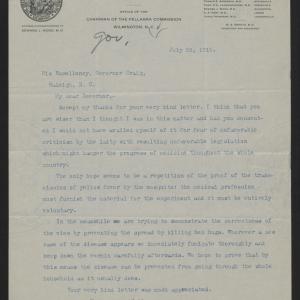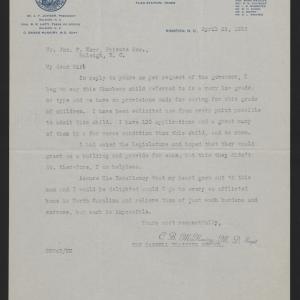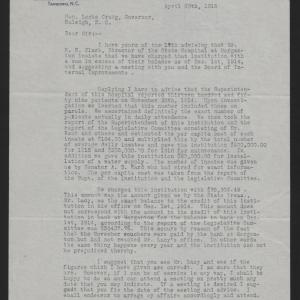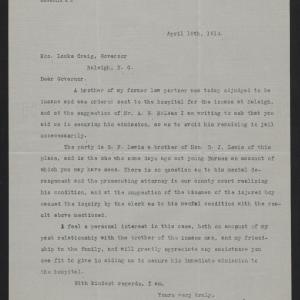SIMMONS & WARD
Attorneys and Counselors at Law
New Bern, N.C. November 19, 1913
Hon. Locke Craig,
Raleigh, N.C.
Dear Governor:-
I am requested by Messrs. W. B. Jones and J. W. Hinsdale, Jr., who appear to be counsel for the Land Company involved, to write you my recollection of the facts. During the regular Session of the General Assembly I was added to the Committee of the Institution for the Blind. It was the unanimous opinion of the Committee that the interest of the blind children and the interest of the State required that a new site should be selected and more room given to these unfortunate people. This conclusion was made public and numerous sites were offered in the vicinity of Raleigh for the location of the Institution. The Committee visited all of these sites and were of unanimous opion that the best site offered was the one finally selected. There were cogent reasons for selecting the particular site. There were whisperings made by some of the leading people of Raleigh against the site selected suggesting that it was unhealthy and other things of like kind. Some of us took the pains to consult with some of the leading physicians of Raleigh and they told us they thought the objection as to health wad without any foundation at all. Owners of the particular site had offered to take $450.00 an acre as we were informed in the early part of the Session for the land. It was also suggested to us that the people of the City of Raleigh would contribute something towards purchasing a site. Owing to the ill health of Senator Little of Anson, Chairman of the Senate Committee, I discharged some duties as a sub-committeeman, which otherwise would have been discharged by Senator Little who had the interest of the unfortunate children greatly at heart. We finally after a prolonged tugging got the land people to recede from the increased price and to agree to take $450.00 per acre, if their site were chosen. We did not know the exact acreage but persuaded them to buy back certain lots that they had sold so that they could deed us a site that we considered entirely satisfactory. The Committee then decided that it would recommend the purchase of the site at $450.00 an acre provided the citizens of Raleigh would raise the excess over Thirty Thousand Dollars. We sent for Mr. J. B. Pearce reported to be the President of the Merchants' Association of Raleigh to come up and have an interview with the Sub-Committee. On this Sub-Committee were Representative Wilson, Chairman of the House Committee, and myself, and Senator Little, I think, and possibly another member of the House, who were charged with the duty of making the arrangement with the representative of the Raleigh business interests. After the agreement was made, we called Mr. Pearce up and he said that the Raleigh people would raise the excess. We reported this back to the Committee and the Committee directed me to draw a Bill looking to the acquisition of the land on the terms proposed. I drew the Bill setting out in a brief way the agreement, not thinking it necessary to have any written agreement with Mr. Pearce on behalf of the people whom he professed to represent. The matter was referred to the joint Appropriations Committee and the proceedings reported and the Committee had the appropriation of Thirty Thousand Dollars put in the General Bond Bill introduced by Senator Long. This, of course, did away with the necessity of the passage of the Bill introduced by me and it was tabled and may be found among the Bills in the State Librarian's charge. We considered the matter settled, but some weeks afterwards I was notified by Prof. Ray that Mr. Pearce denied the agreement and he requested me to attend a meeting of the Trustees at Raleigh on a certain date. I attended as did Mr. Wilson, Chairman of the House Committee and member of the Sub-Committee. We went over the matter and Mr. Pearce was there and denied the arrangement we had suggested. The question was then raised there in the meeting as to what should be done with the bargain we had with the real estate people. After some discussion, I told them I regarded the land as a necessity for the State and the Institution and suggested that they close the trade up and pay the Thirty Thousand Dollars on the purchase money and if the citizens of Raleigh refused to raise the balance, I would bring the matter before the General Assembly and try to get a just arrangement made so that the sellers would be paid the balance for their land and in case the Assembly would not do that, let them take back enough of the land to pay for the unpaid part of the purchase money or if the Legislature repudiated the matter the Land could be deeded back to the Company. At the regular Session of the Assembly Senator Little of Wake, I believe, had introduced a Bill providing for the payment of this amount before I reached Raleigh, as I was detained some days on a Western trip. The matter came up in the General Assembly at the Special Session and was thoroughly threshed out in the Committee and before the Body itself but the Bill passed the Committee on Appropriations and passed the Senate and House and became a law to pay the balance of the purchase money. There were people who would whisper in your ears that there were no strings tied to the Deed made to the Board of Trustees which I inferred to mean that there were no conditions attached to the Deed but that the Deed had been made absolute on its face. A good many Senators wished to sell the property and pay the unpaid part of the purchase money to the Land people and cover the balance in the Treasury. I fought this for the reason I regarded holding the land as being a public necessity. I felt that the appropriation was absolutely due the sellers of the land because it had been conveyed as I understood it under the tentative arrangement that had been suggested in a meeting of the Board.
I desire to say here that I never saw any representative of the Land Company during any of the negotiations except when there was present besides myself at least one or two other members of the Legislative Committee.
Truly,
W/H








